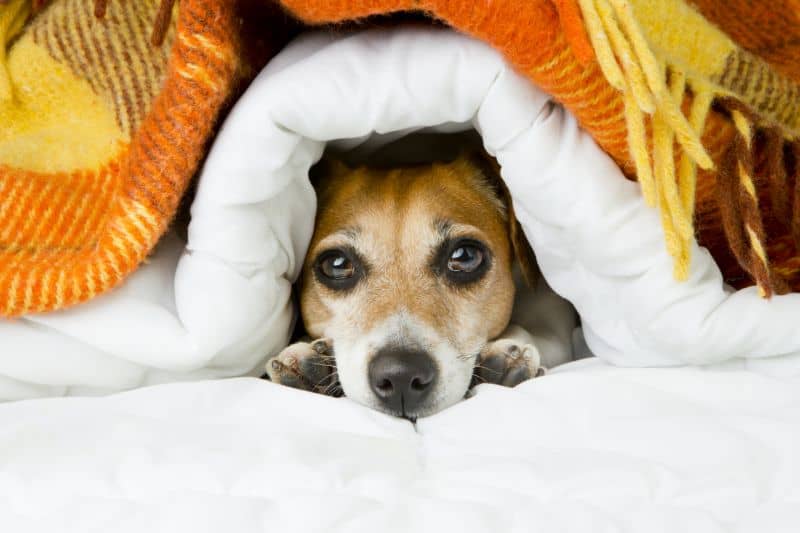Reasons Your Dog Won’t Sleep at Night
If your dog is restless or unable to settle in for bed at the end of a long day, it’s definitely something to pay attention to. Most puppers are happy to snooze and an unwillingness to do so is a clear sign of a problem.
The most common causes of sleep issues in dogs are:

Disturbances – Noises and Smells
Bumps in the night can affect dogs just as much as us. Remember, dogs have much better hearing than us; so if you’re kept awake by the next-door neighbours or a prowling cat outside, think how much worse it could be for your pet. They may even be hearing things you can’t hear! If your dog appears to fall asleep fine, but keeps waking up, you may want to investigate noise. Is the TV too loud, is the washing machine too close by, or perhaps you are talking too much?
For obvious sources of noise you can control, remember to keep the volume down while it’s doggy naptime. If there are noises you can’t control, or can’t even hear, you may have to think about where your dog sleeps. Is there a quieter part of the house, or a room with thick soundproof windows? You may want to consider adding extra soundproofing if it’s really bad. Disturbances don’t just extend to the auditory. Some very sensitive pups may not like sleeping next to strong smells, such as rubbish bins or chemicals. Spend some time thinking about your pet’s sleeping arrangement and if you’d be happy nodding off there.
How to get your dog to sleep peacefully at night
Now you know a couple of reasons why your dog might be restless at night not sleeping so let’s look at how to fix these issues with some universal possible fixes.
Like I said earlier dogs need the exercise to keep their energy down and their bodys healthy. A good way to make sure your dog is calm for bedtime is a good exercise session. When I say this many people imagine running and are like no thanks, but it can be super easy things like fetch or a walk. If you have a calm dog they may only need a simple walk down the block to burn off the energy they have or if you have an excitable one a long play session in the back yard can help out a lot. If you believe your dog could benefit at night from a good play session do it! There is no harm and it will strengthen the bond between you and Fido.
Sometimes exercise just doesnt do the trick and isnt the right method for the cause. In these situations, it may be a better idea to use one of the many calming agents out there for dogs. When getting a supplement or anything to help with your dogs anxiety make sure to contact your vet to make sure it is right for your dog. Supplements like CBD oil or CBD infused coconut oil can be incredibly beneficial to your dogs health while still being an anxiety reducer that can help calm your dog. There are also things like anxiety blankets to make your dog feel like they are being held making them relax and fall asleep better. No matter what you get there should be products for dogs, as products for humans could be harmful to your furry friend
Older dogs with pains and even younger dogs can benefit from a truly orthopedic dog bed. An orthopedic dog bed is made to relieve the pressures that come from dogs lying down that can be uncomfortable if your dog faces joint or muscle pains. Many dog beds are claiming to be memory foam or orthopedic but many arent and can keep your dog staying restless at night. A true orthopedic bed can help reduce joint pain and prevent worsening to allow your dog old or young to keep getting the best sleep throughout their lifetime.
Check out or line of Orthopedic Dog Beds
BuddyRest was founded on the idea of supporting older dogs and based our first products on helping joint pains in dogs. We know dog sleep science and hope this blog helped you out.
THAT’S WHY Your Dog Should NOT Sleep With You In Bed!
Some days you want nothing more than to just go straight to your comfortable bed and fall asleep, yet your furry friend has other ideas. If youre winding down for the night and your dog just doesnt seem ready to relax or they look anxious there may be a reason. A dog being restless at night and not sleeping can be a common problem that is easily fixed, let’s talk about how!